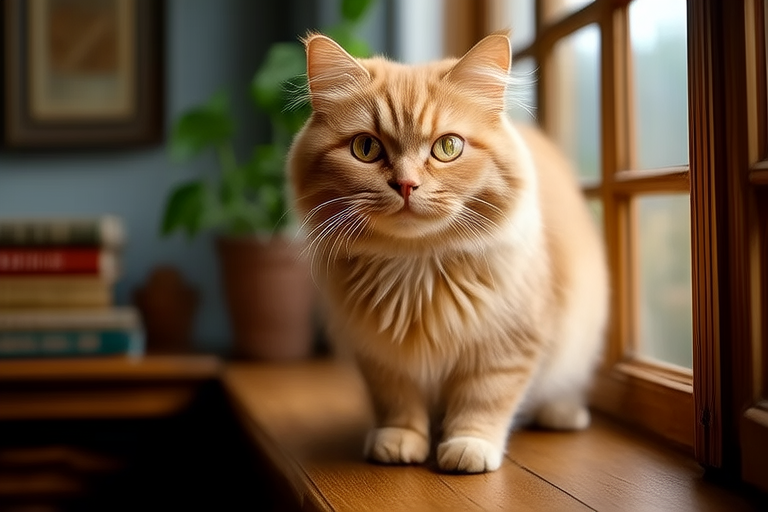The Unique World of Owning a Golden British Shorthair Cat
Golden British Shorthair cats are a sight to behold, with their plush, dense fur and striking golden eyes. These felines have captivated the hearts of many cat enthusiasts with their unique blend of charm and grace. In this article, we will delve into the world of owning a golden British Shorthair, exploring their appearance, temperament, grooming needs, health care, and the joys and challenges of having one as part of your family.
A Distinct Charm and Appearance
The golden British Shorthair cat stands out with its luxurious coat, which is typically a rich, warm shade of gold. Their fur is thick and dense, providing them with a plush, soft texture that feels almost like velvet when stroked. This coat not only adds to their aesthetic appeal but also serves as insulation against cold weather, making them well-suited to cooler climates. The golden eyes of these cats are particularly striking, adding a touch of elegance and mystery to their already captivating appearance.
Besides their physical attributes, golden British Shorthairs possess a regal demeanor. They move with a certain grace and poise, exuding an air of sophistication that makes them stand out among other cat breeds. Their facial features are rounded and symmetrical, complemented by large, expressive eyes that seem to convey a wealth of emotion. This combination of looks and presence ensures that they are always the center of attention wherever they go.
Temperament: Calm, Gentle, and Adaptable
One of the most appealing aspects of golden British Shorthair cats is their temperament. Known for their calm and gentle nature, these cats are perfect companions for families seeking a laid-back pet. They are generally very patient and can easily coexist with children, other pets, and even elderly individuals. Their adaptability makes them suitable for various living environments, whether it be a bustling household or a quieter setting.
Despite their independent streak, golden British Shorthairs are affectionate and enjoy spending time with their human companions. They are often described as being more ‘dog-like’ in their behavior, as they tend to form strong bonds with their owners and can even be trained to perform simple tricks. Their playful yet independent personalities make them delightful companions, offering a balance between companionship and space.
Grooming and Health Care
Owning a golden British Shorthair requires regular grooming to maintain their beautiful coat. Their dense fur can easily mat if not cared for properly, so brushing them at least once a week is recommended. Using a slicker brush can help remove loose hair and prevent tangles. During shedding seasons, which typically occur in spring and autumn, more frequent brushing may be necessary to keep their coat in top condition.
Dietary needs for golden British Shorthair cats are similar to those of other domestic cats, but it’s important to choose high-quality food that meets their nutritional requirements. A balanced diet rich in proteins, fats, and essential vitamins and minerals is crucial for maintaining their overall health. Consultation with a veterinarian can provide personalized dietary recommendations based on the individual cat’s age, weight, and activity level.
Like any other breed, golden British Shorthairs are prone to certain health issues. Some common concerns include obesity, dental problems, and heart disease. Regular veterinary check-ups are essential to monitor their health and address any potential issues early on. Additionally, keeping them active through play and exercise can help prevent obesity and promote a healthier lifestyle.
Challenges and Joys of Ownership
Owning a golden British Shorthair cat comes with its share of challenges and joys. One of the main joys is their playful yet independent nature. They are often found engaging in activities that entertain themselves, such as chasing toys or climbing furniture. Their independence can sometimes lead to moments of solitude, but this also means they are less likely to become overly dependent on their owners.
Training a golden British Shorthair can be rewarding but requires patience and consistency. Positive reinforcement techniques, such as treats and praise, work best when teaching them new behaviors. Simple tricks like fetching toys or sitting on command can be achieved with consistent practice. However, it’s important to remember that each cat is different, and some may take longer to learn than others.
One of the unique challenges of owning a golden British Shorthair is ensuring they receive enough mental stimulation. Due to their intelligence, they can become bored easily if left without adequate activities. Providing interactive toys, puzzle feeders, and regular play sessions can help keep their minds engaged and prevent behavioral issues.
Advice for Prospective Owners
For those considering adopting a golden British Shorthair, there are several steps to ensure a smooth transition into family life. First and foremost, it’s important to create a nurturing environment that provides comfort and security. Designating a quiet, cozy space for your cat to retreat to when needed can help them feel safe and secure in their new home.
Incorporating your golden British Shorthair into daily family routines can also be beneficial. Establishing a predictable schedule for feeding, playtime, and grooming helps your cat feel more at ease and integrated into the household. Spending quality time with your cat through interactive play and cuddling can strengthen the bond between you and your feline companion.
Lastly, remember that every cat is unique, and it may take time for your golden British Shorthair to fully adjust to their new surroundings. Patience and understanding are key during this period. With proper care, love, and attention, owning a golden British Shorthair can be a truly enriching experience for both the cat and their owner.
